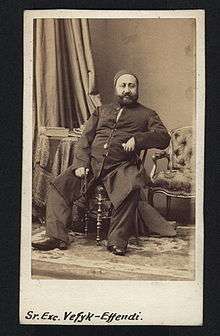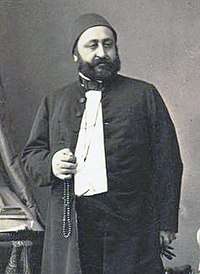Ahmed Vefik Pasha
Ahmed Vefik Pasha (Ottoman Turkish: احمد وفیق پاشا) (3 July 1823, Constantinople – 2 April 1891, Constantinople), was an Ottoman statesman, diplomat, scholar, playwright, and translator during the Tanzimat and First Constitutional Era periods.[1] He was commissioned with top-rank governmental duties, including presiding over the first Ottoman Parliament in 1877.[2] He also served as Grand Vizier for two brief periods. Vefik also established the first Ottoman theatre[3] and initiated the first Western style theatre plays in Bursa and translated Molière's major works. His portrait was depicted on a former Turkish postcard stamp.[4]

Ahmed Vefik | |
|---|---|
 | |
| Grand Vizier of the Ottoman Empire | |
| In office 4 February 1878 – 18 April 1878 | |
| Monarch | Abdul Hamid II |
| Preceded by | Ahmed Hamdi Pasha |
| Succeeded by | Mehmed Sadık Pasha |
| In office 1 December 1882 – 3 December 1882 | |
| Monarch | Abdul Hamid II |
| Preceded by | Mehmed Sadık Pasha |
| Succeeded by | Mehmed Said Pasha |
| Personal details | |
| Born | 3 July 1823 Constantinople, Ottoman Empire |
| Died | 1891 Constantinople, Ottoman Empire |
| Nationality | Ottoman |
Biography
Ahmed Vefik Pasha was born of Greek extraction,[5][6][7][8][9][10][11] his ancestors having previously converted to Islam, like many other Greek Muslims particularly from Crete (Cretan Turks) and Southern Macedonia in what is now northwestern Republic of Greece (see Vallahades).[5] He started his education in 1831 in Constantinople and later went to Paris with his family, where he graduated from Saint Louis College.
Ahmed Vefik became the Minister of Education of the Ottoman Empire and Grand Vizier two times. He built a theatre in Bursa when he was made the governor of the city. In 1860, he became the Ottoman ambassador to France. He wrote the first Turkish dictionary and is considered to be the among the first Pan-Turkists.
References
- "Ahmed Vefik Paşa". www.britannica.com. Retrieved 2009-08-12.
Ahmed Vefik Paşa Ottoman statesman and scholar born July 6, 1823, Constantinople [now Istanbul] died April 2, 1891, Constantinople. Ottoman statesman and scholar
- "Ahmed Vefik Paşa". www.britannica.com. Retrieved 2009-08-12.
Ahmed Vefik Paşa Ottoman statesman and scholar born July 6, 1823, Constantinople [now Istanbul] died April 2, 1891, Constantinople… He presided over the first Ottoman Parliament (1877) and was twice appointed grand vizier (chief minister) for brief periods in 1878 and 1882.
- "Ahmed Vefik Paşa". www.britannica.com. Retrieved 2009-08-12.
Ahmed Vefik Paşa Ottoman statesman and scholar born July 6, 1823, Constantinople [now Istanbul] died April 2, 1891, Constantinople....In 1879 he became the vali (governor) of Bursa, where he sponsored important reforms in sanitation, education, and agriculture and established the first Ottoman theatre.
- http://4.bp.blogspot.com/-PS-meVFiM9M/UGvlsnAoQEI/AAAAAAAAGLM/K2VVM9MNFP4/s1600/untitledAVP.bmp
- Berkes, Niyazi – Ahmad, Feroz (1998). The development of secularism in Turkey. C. Hurst & Co. Publishers. p. 29. ISBN 1-85065-344-5.
Ahmed Vefik Pasa (1823-91), the grandson of a Greek convert to Islam and the holder of several of the highest positions, was one of those interested in Ottoman studies.
CS1 maint: uses authors parameter (link) - Galton, Sir Francis (1864). Vacation tourists and notes of travel in 1860 [1861, 1962-3]. Macmillan. p. 91. OCLC 228708521.
The statesman whom the Turks like best is Achmet Vefyk Effendi. Although a Greek by descent, he is a more orthodox Moslem than Fuad or Aali, and is the head of the reforming party, whose object is to bring about reform for the purpose of re-establishing the Turkish empire on the basis on which it stood in its palmy day, rather than adopt European customs.
- Stewart, Desmond (1971). The Middle East: temple of Janus. Doubleday. p. 189. OCLC 135026.
Ahmed Vefik Pasha was the grandson of a Greek convert to Islam.
- Layard, Sir Austen Henry – Bruce, William Napier – Otway, Sir Arthur John (1903). Sir A. Henry Layard, G.C.B., D.C.L. J. Murray. p. 93. OCLC 24585567.
Fuad Pasha — unlike Ahmed Vefyk, who had Greek blood in his veins — was a pure Turk by descent.
CS1 maint: uses authors parameter (link) - Pickthall, Marmaduke William - Islamic Culture Board – Asad, Muhammad (1975). Islamic culture. Islamic Culture Board - Hyderabad, Deccan. OCLC 1774508.
Ahmad Vefik Pasha (grandson of a Greek convert) published influential works : Les Tuns Anciens et Modernes (1169) and Lahja-i-Osmani, respectively
CS1 maint: uses authors parameter (link) - Macfie, A. L. (1998). The end of the Ottoman Empire, 1908-1923. Longman. p. 85. ISBN 0-582-28763-4.
In 1876 Ahmed Vefik Pasha, the grandson of a Greek convert to Islam, and a keen student of Turkish customs, published the first Turkish-Ottoman dictionary
- Taher, Mohamed (1997). Encyclopaedic survey of Islamic culture. Anmol Publications PVT. LTD. p. 97. ISBN 81-7488-487-4.
Ahmad Vefik Pasha) (grandson of a Greek convert) published influential works : Les Turcs Anciens et Modernes ( 1 1 69) and Lahja-i-Osmani, respectively
Further reading
- Whitaker, Edgar (1911). . In Chisholm, Hugh (ed.). Encyclopædia Britannica. 1 (11th ed.). Cambridge University Press. pp. 432–433. This contains a more detailed biography, although comparison with the newer Encyclopædia Britannica entry suggests the information about his early life is in error.
| Political offices | ||
|---|---|---|
| Preceded by Ahmed Hamdi Pasha |
Grand Vizier of the Ottoman Empire 4 February 1878 – 18 April 1878 |
Succeeded by Mehmed Sadık Pasha |
| Preceded by Mehmed Said Pasha |
Grand Vizier of the Ottoman Empire 1 December 1882 – 3 December 1882 |
Succeeded by Mehmed Said Pasha |